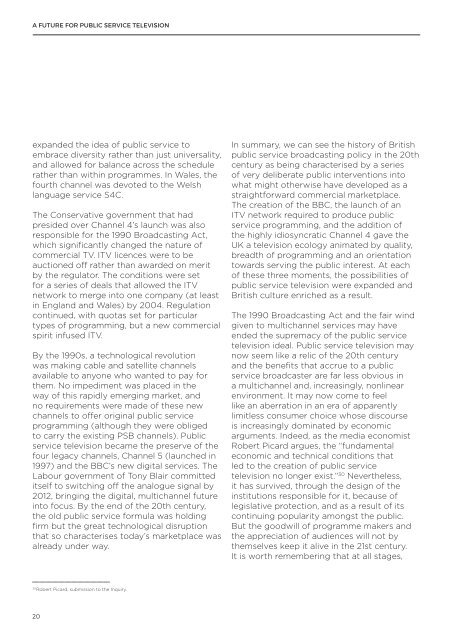A FUTURE FOR PUBLIC SERVICE TELEVISION CONTENT AND PLATFORMS IN A DIGITAL WORLD
FOTV-Report-Online-SP
FOTV-Report-Online-SP
You also want an ePaper? Increase the reach of your titles
YUMPU automatically turns print PDFs into web optimized ePapers that Google loves.
A <strong>FUTURE</strong> <strong>FOR</strong> <strong>PUBLIC</strong> <strong>SERVICE</strong> <strong>TELEVISION</strong><br />
expanded the idea of public service to<br />
embrace diversity rather than just universality,<br />
and allowed for balance across the schedule<br />
rather than within programmes. In Wales, the<br />
fourth channel was devoted to the Welsh<br />
language service S4C.<br />
The Conservative government that had<br />
presided over Channel 4’s launch was also<br />
responsible for the 1990 Broadcasting Act,<br />
which significantly changed the nature of<br />
commercial TV. ITV licences were to be<br />
auctioned off rather than awarded on merit<br />
by the regulator. The conditions were set<br />
for a series of deals that allowed the ITV<br />
network to merge into one company (at least<br />
in England and Wales) by 2004. Regulation<br />
continued, with quotas set for particular<br />
types of programming, but a new commercial<br />
spirit infused ITV.<br />
By the 1990s, a technological revolution<br />
was making cable and satellite channels<br />
available to anyone who wanted to pay for<br />
them. No impediment was placed in the<br />
way of this rapidly emerging market, and<br />
no requirements were made of these new<br />
channels to offer original public service<br />
programming (although they were obliged<br />
to carry the existing PSB channels). Public<br />
service television became the preserve of the<br />
four legacy channels, Channel 5 (launched in<br />
1997) and the BBC’s new digital services. The<br />
Labour government of Tony Blair committed<br />
itself to switching off the analogue signal by<br />
2012, bringing the digital, multichannel future<br />
into focus. By the end of the 20th century,<br />
the old public service formula was holding<br />
firm but the great technological disruption<br />
that so characterises today’s marketplace was<br />
already under way.<br />
In summary, we can see the history of British<br />
public service broadcasting policy in the 20th<br />
century as being characterised by a series<br />
of very deliberate public interventions into<br />
what might otherwise have developed as a<br />
straightforward commercial marketplace.<br />
The creation of the BBC, the launch of an<br />
ITV network required to produce public<br />
service programming, and the addition of<br />
the highly idiosyncratic Channel 4 gave the<br />
UK a television ecology animated by quality,<br />
breadth of programming and an orientation<br />
towards serving the public interest. At each<br />
of these three moments, the possibilities of<br />
public service television were expanded and<br />
British culture enriched as a result.<br />
The 1990 Broadcasting Act and the fair wind<br />
given to multichannel services may have<br />
ended the supremacy of the public service<br />
television ideal. Public service television may<br />
now seem like a relic of the 20th century<br />
and the benefits that accrue to a public<br />
service broadcaster are far less obvious in<br />
a multichannel and, increasingly, nonlinear<br />
environment. It may now come to feel<br />
like an aberration in an era of apparently<br />
limitless consumer choice whose discourse<br />
is increasingly dominated by economic<br />
arguments. Indeed, as the media economist<br />
Robert Picard argues, the “fundamental<br />
economic and technical conditions that<br />
led to the creation of public service<br />
television no longer exist.” 30 Nevertheless,<br />
it has survived, through the design of the<br />
institutions responsible for it, because of<br />
legislative protection, and as a result of its<br />
continuing popularity amongst the public.<br />
But the goodwill of programme makers and<br />
the appreciation of audiences will not by<br />
themselves keep it alive in the 21st century.<br />
It is worth remembering that at all stages,<br />
30<br />
Robert Picard, submission to the Inquiry.<br />
20


